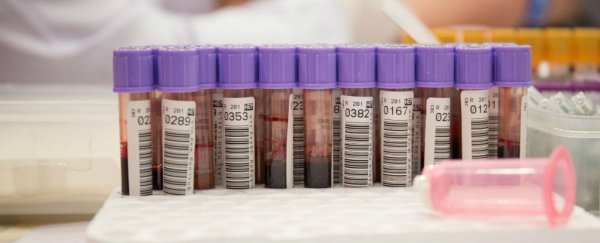Scientists have discovered an antibody produced by an HIV-positive patient that neutralises 98 percent of all HIV strains tested - including most of the strains that are resistant to other antibodies of the same class.
Due to HIV's ability to rapidly respond to the body's immune defences, an antibody that can block a wide range of strains has been very hard to come by. But now that we've found one, it could form the basis of a new vaccine against the virus.
Researchers from the US National Institutes of Health (NIH) found that the antibody, called NG, was able to maintain its ability to recognise the HIV virus, even as the virus morphed and broke away from it.
It's also up to 10 times more potent than VRC01 - an antibody in the same class as N6, which has progressed to phase II clinical trials in human patients, after protecting monkeys against HIV for nearly six months.
"The discovery and characterisation of this antibody with exceptional breadth and potency against HIV provides an important new lead for the development of strategies to prevent and treat HIV infection," said Anthony S. Fauci from the US National Institute of Allergy and Infectious Diseases.
An antibody is a protein produced by the immune system in response to harmful pathogens such as bacteria and viruses.
Antibodies are responsible for identifying and destroying these pathogens by binding to them and either neutralising their biological effects on their own, or signalling to white blood cells to come and destroy them.
When the researchers exposed N6 to 181 different strains of HIV, it managed to destroy 98 percent of them, including 16 of 20 strains resistant to other antibodies of the same class.
That's a significant step up from the VRC01 antibody, which stops up to 90 percent of HIV strains from infecting human cells.
And, as the researchers report, not only did N6 show extraordinary breadth - it's coupled that with incredible potency:
"Of those antibodies being considered for clinical development, there are examples of antibodies that are extremely broad but moderate in potency (e.g. 10E8 or VRC01) or extremely potent and less broad (e.g. PGT121 or PGDM1400).
However, the discovery of the N6 antibody demonstrates that this new VRC01-class antibody can mediate both extraordinary breadth and potency even against isolates traditionally resistant to antibodies in this class."
So why is N6 so successful against HIV?
The researchers tracked its evolution over time to see how it responded to the shape-shifting defences of the HIV virus, and found that it relied less on binding with parts of the virus that are prone to changing - known as the V5 region - and more on parts that change very little across different strains.
By attaching to these more consistent parts of the virus, N6 is able to prevent HIV from attaching itself to a host's immune cells and attacking them - which is what makes HIV-positive people so vulnerable to AIDS.
"N6 evolved such that its binding was relatively insensitive to the absence or loss of individual contacts typically found in the VRC01 class," the team reports.
They also found that mutations of the HIV virus that happened to be resistant to N6 rarely cropped up, which suggests that the virus couldn't respond to this antibody as quickly as it has with other treatments scientists have discovered recently.
"The rare occurrence of N6 resistance mutations suggests that such mutations come at a relatively high fitness cost, which might represent a partial barrier to the selection of resistant mutants," the team explains.
Of course, these results have so far only been demonstrated in the lab, so until we see the same levels of success in actual human trials, we need to remain cautiously optimistic.
But with a recent trial of a different treatment appearing to have erased HIV from a patient's blood, and researchers honing in on whatever seems to be preventing one in 10 kids from catching the virus, we're making real progress against the disease.
Maybe this is how we end up beating it.
The results have been published in Immunity.
